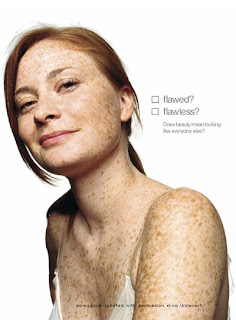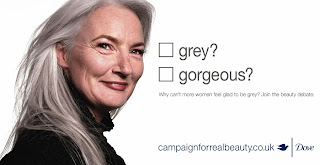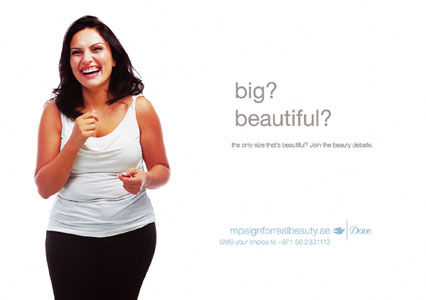Messofanego
Banned
UPDATE: 13th November BBC will be running a season of programmes about body image from Monday 19 - Wednesday 28th November.
They ran an article on the FIVE photos that sparked body image debates over the years, including the Dove real beauty campaign.
Well worth reading the whole thing, and can't wait to tune in to the program.
http://www.bbc.co.uk/news/magazine-20252921
ORIGINAL POST:
http://www.independent.co.uk/voices...essages-we-send-to-our-daughters-8222556.html (The Independent)
Wow. My mother does this and it's now transferred to my sister who's very self-conscious about her body image to the point of actual delusion of thinking she's fat even though she has 20 BMI. She's going to be a doctor in a year or so and yet still that won't be enough. Then the rest of the world just feeds that confirmation bias to become an onslaught.
The Dove "real beauty" campaign [AMAZING AD] (started in 2004) was a good push in the right direction. Even though advertising is meant to show perfect images a little reality would be good especially when people are hurting themselves over fake images. It's honestly down to them since they're everywhere.




They ran an article on the FIVE photos that sparked body image debates over the years, including the Dove real beauty campaign.
Well worth reading the whole thing, and can't wait to tune in to the program.
http://www.bbc.co.uk/news/magazine-20252921
- Dove real beauty ad campaign (2004)
- Josh Sundquist (2006)

- Lizzie Miller NSFW (2009)
"If you're bigger honestly than a size six [US size six usually converts to a UK size 10] they'll put you on the plus-size board which is really sad," says Miller. "I feel like the fashion industry always goes to that extreme. Models who are size zero and two are actually modelling clothes for women that are actually size six to eight. So I feel like with us, we're size 12-14 but really we're modelling for girls that are 16-20." - Isabelle Caro RIP NSFW (2007; Anti-Anorexia campaign)
"Most seriously, these images we find so shocking, don't shock someone with an eating disorder. They excite, encourage and motivate them to get as thin, if not thinner than the person depicted." - Demi Moore (1991; the famous 'Demi' pregnant pose)
Moore's earnings are said to have risen from $350,000 in 1990 to $3 million in 1992 at least in part as a consequence of the photo.
ORIGINAL POST:
http://www.independent.co.uk/voices...essages-we-send-to-our-daughters-8222556.html (The Independent)
Last week, the Everyday Sexism Project received a deeply moving entry from a fifteen-year-old girl.
It might seem shocking to some, but it was just the latest of many hundreds of similar posts we have received from girls in their teens and younger.
She wrote “I’m fifteen and feel like girls my age are under a lot of pressure…I know I am smart, I know I am kind and funny…everybody around me keeps telling me I can be whatever I want to be. I know all this but I just don’t feel that way.”
She continued: “I always feel like if I don’t look a certain way, if boys don’t think I’m ‘sexy’ or ‘hot’ then I've failed and it doesn't even matter if I am a doctor or writer, I'll still feel like nothing...successful women are only considered a success if they are successful AND hot, and I worry constantly that I won't be. What if my boobs don't grow? What if I don't have the perfect body? What if my hips don't widen and give me a little waist? If none of that happens I feel like [sic] there's no point in doing anything because I'll just be the 'fat ugly girl' regardless of whether I do become a doctor or not.”
Her words reveal a keen perception of double standards in a society that tells young women they can have all the same dreams men can, study at any academic institution they wish and aim for any career path they choose, whilst simultaneously inundating them with an onslaught of daily messages that as women they will be judged almost exclusively on the basis of their looks, regardless of success.
She is even aware of this influence, writing: “I wish the people who had real power and control the images and messages we get fed all day actually thought about what they did for once… I know the girls in adverts are airbrushed. I know beauty is on the inside. But I still feel like I'm not good enough.”
But an awareness of the effect these messages can have is not a strong enough defence against them; not for a vulnerable teenage girl in the throes of peer pressure and puberty, nor even for adult women with a keen awareness of the images and messages that manipulate our self-view. She describes the experience of watching her own mother struggle with the same expectations and insecurities:
“I watch my mum tear herself apart everyday because her boobs are sagging and her skin is wrinkling, she feels like she is ugly even though she is amazing.”
Holli Rubin, a representative of Endangered Bodies, says: “this is a problem of epidemic proportions. Over 60% of adults feel ashamed of how they look…when we put ourselves down in front of our children we are modelling a very negative view. This gets passed down to children who internalize it and consequently begin to feel the same way.”
Within minutes of receiving the teenager’s frank account, messages were pouring in from other women, young and old, testifying to the same feelings of pressure and inadequacy regardless of age or achievement.
...
Hundreds of similar Everyday Sexism entries testify that she is far from alone amongst her peers too. One teenager, who explains that she “chooses to wear modest clothes for religious reasons”, even echoes the same words, choosing the pseudonym “Ugly Girl”:
“I've had people call me hideous, mock me for expressing feelings towards the opposite sex, and outright laugh in my face for believing I could somehow be beautiful and value myself on the inside... Just because I am a women [sic] my image is treated as the only thing that should define me and that should matter. This is the concept of sexism that haunts me in everyday life and I despise it.”
A recent report by the All Party Parliamentary Group on Body Image revealed girls as young as five now worry about their weight and appearance and “one in four seven year old girls have tried to lose weight at least once.” It cited research showing that 13% of girls age 10-17 would avoid even giving an opinion because of insecurities about the way they look.
Last year a teenage girl from my senior school committed suicide after a preoccupation with weight and body image prompted her to develop an eating disorder. At the inquest, the coroner referred to the pressure placed on teenagers by images of “wafer thin girls” in magazines. He stated that the fashion industry was “directly responsible for what happened”.
From the advertising industry and its narrow media ideal of female beauty to the normalised objectification of Page 3; from articles that deconstruct the outfits of female politicians to the programs teaching girls how to nip, tuck, change and disguise their bodies; these messages are everywhere, everyday. The pressure on women and young girls to conform to such stereotypes is overwhelming, and until it is tackled, it will continue to undermine attempts to convince young women like this teenager that she really can “be whatever I want to be”.
Wow. My mother does this and it's now transferred to my sister who's very self-conscious about her body image to the point of actual delusion of thinking she's fat even though she has 20 BMI. She's going to be a doctor in a year or so and yet still that won't be enough. Then the rest of the world just feeds that confirmation bias to become an onslaught.
The Dove "real beauty" campaign [AMAZING AD] (started in 2004) was a good push in the right direction. Even though advertising is meant to show perfect images a little reality would be good especially when people are hurting themselves over fake images. It's honestly down to them since they're everywhere.





